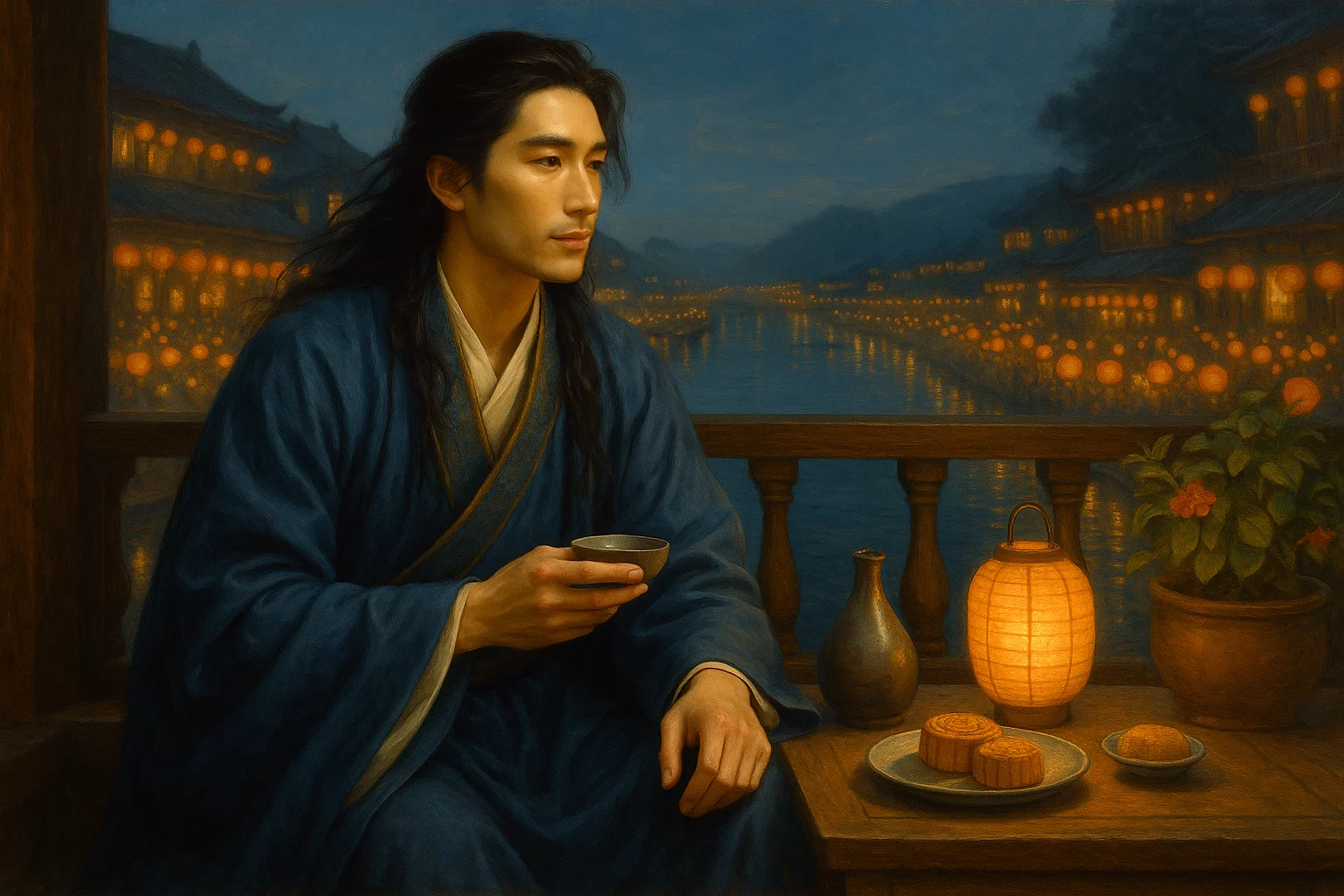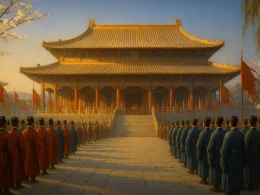The Milky Way coils—three thousand turns,
Ducks dip, egrets rise through jade-green burns.
Where drifts the homeward sail?
A tower flushed with sunset pale.
Sky loathes the plum's bold overflow,
Thus snowstorms lock each bough.
From deep courtyard, I lift the screen—
Cold grips the river, cold grips my dream.
Original Poem
「菩萨蛮 · 梅雪」
周邦彦
银河宛转三千曲。浴凫飞鹭澄波绿。
何处是归舟。夕阳江上楼。
天憎梅浪发。故下封枝雪。
深院卷帘看。应怜江上寒。
Interpretation
Though the exact composition date remains uncertain, scholars speculate this ci was written during Zhou Bangyan's academic sojourn in the Imperial College or his travels through Jiangnan. Superficially depicting plum blossoms in snow, the poem subtly conveys the melancholy of displacement and emotional solitude. Through exquisite metaphorical imagery and an intricate interplay of reality and imagination, Zhou merges natural scenery with inner sentiment, articulating a profound loneliness—"the body unreturned, the heart already chilled." This work exemplifies Zhou's signature style of seamless scene-emotion fusion and refined imagistic craftsmanship.
First Stanza: "银河宛转三千曲,浴凫飞鹭澄波绿。何处是归舟?夕阳江上楼。"
Yín hé wǎn zhuǎn sān qiān qǔ, yù fú fēi lù chéng bō lǜ. Hé chù shì guī zhōu? Xī yáng jiāng shàng lóu.
The river twists like a silver galaxy's thousand bends,
where bathing ducks and flying egrets dot emerald waves.
But where is the homebound boat?
Only a riverside tower
stands lone in sunset glow.
The opening stanza paints a post-snow riverscape with cosmic grandeur. The "silver galaxy" (银河) metaphor elevates the winding river to celestial splendor, while "emerald waves" (澄波绿) ground the scene in vivid naturalism. Waterfowl—ducks and egrets—animate the tableau, their carefree movements contrasting with the static, forlorn tower. The unanswered "where is the homebound boat?" (何处是归舟) pivots from description to existential query, the tower's silhouette against sunset embodying unanswered longing.
Second Stanza: "天憎梅浪发,故下封枝雪。深院卷帘看,应怜江上寒。"
Tiān zēng méi làng fā, gù xià fēng zhī xuě. Shēn yuàn juǎn lián kàn, yīng lián jiāng shàng hán.
Heaven hates the plum's reckless bloom,
so seals its branches with snow.
From deep courtyard, you roll up blinds—
do you pity the river's chill?
Here Zhou's imagery turns metaphysical. The personified "heaven" (天) punishing the plum's "reckless bloom" (浪发) with sealing snow (封枝雪) suggests cosmic interference in natural beauty, paralleling human vulnerability to fate's whims. The stanza's second half introduces an implied beloved—the "you" (你) who observes from behind blinds—creating emotional voltage between interior warmth ("deep courtyard") and exterior suffering ("river's chill"). The final line's poignant question (应怜江上寒) lingers like frost in air, unanswerable yet resonant.
Holistic Appreciation
This ci transcends conventional "plum-and-snow" poetry by constructing a tripartite emotional architecture: celestial river vistas (stanza one), botanical allegory (stanza two), and human interconnection (stanza two's close). Zhou choreographs these elements into a meditation on separation's thermodynamics—the contrast between the river's literal chill and the warmth of unseen human presence.
The poem's brilliance lies in its recursive motifs: the galaxy-river's "thousand bends" (三千曲) mirror life's unpredictable turns; the "sealing snow" (封枝雪) symbolizes both nature's cruelty and emotional isolation; the "rolled-up blinds" (卷帘) become permeable barriers between separated lovers. Through these layered reflections, Zhou transforms seasonal observation into a universal portrait of longing.
Artistic Merits
- Cosmological naturalism
The river-galaxy conceit dissolves boundaries between terrestrial and celestial, making human loneliness simultaneously intimate and vast. - Personified meteorology
"Heaven hates" (天憎) dramatizes weather as moral force, framing the plum's suffering as existential parable. - Architectural psychology
The "deep courtyard" (深院) and riverside tower form psychological poles—enclosure versus exposure, privacy versus longing. - Interrogative intimacy
The unanswered "do you pity?" (应怜) crystallizes the poem's central tension between connection and solitude.
Insights
Zhou's poem reveals how artistic observation becomes emotional alchemy. By projecting human feelings onto plum blossoms and winter rivers, he demonstrates nature's capacity to mirror our inner states—a concept resonating with modern ecological consciousness.
The work also models sophisticated emotional communication. Rather than declaring "I miss you," Zhou constructs an intricate symbolic landscape (snow-sealed plums, chilled rivers) that his implied beloved must interpret. This indirectness—characteristic of classical Chinese lyricism—suggests that true intimacy often resides in shared decoding of the world's signs.
Ultimately, the poem posits that beauty and sorrow are inextricable: the plum's reckless blooming invites destructive snow, just as human connection risks heartbreak. Yet Zhou implies this very fragility gives existence its poignant splendor—like a galaxy reflected in a frozen river, dazzling precisely because it cannot last.
About the Poet

Zhou Bangyan (周邦彦 1056 - 1121), a native of Qiantang (modern Hangzhou, Zhejiang), was the culminating master of the wanyue (graceful and restrained) ci poetry of the Northern Song Dynasty. A virtuoso in musical temperament, his ci are renowned for their opulent refinement and technical perfection. He created dozens of new melodic patterns (cipai) and adhered to strict tonal rules, earning him the title "Crown of Ci Poets." His influence extended to Southern Song masters like Jiang Kui and Wu Wenying, establishing him as the founding patriarch of the Rhymed Ci School.












